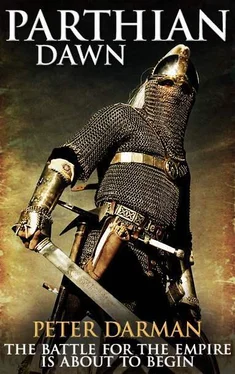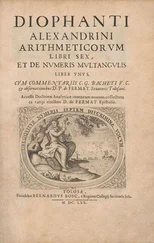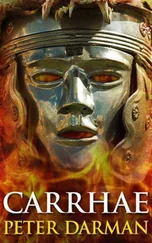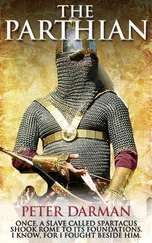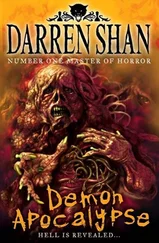Peter Darman - Parthian Dawn
Здесь есть возможность читать онлайн «Peter Darman - Parthian Dawn» весь текст электронной книги совершенно бесплатно (целиком полную версию без сокращений). В некоторых случаях можно слушать аудио, скачать через торрент в формате fb2 и присутствует краткое содержание. Год выпуска: 2012, Жанр: Исторические приключения, на английском языке. Описание произведения, (предисловие) а так же отзывы посетителей доступны на портале библиотеки ЛибКат.
- Название:Parthian Dawn
- Автор:
- Жанр:
- Год:2012
- ISBN:нет данных
- Рейтинг книги:3 / 5. Голосов: 1
-
Избранное:Добавить в избранное
- Отзывы:
-
Ваша оценка:
- 60
- 1
- 2
- 3
- 4
- 5
Parthian Dawn: краткое содержание, описание и аннотация
Предлагаем к чтению аннотацию, описание, краткое содержание или предисловие (зависит от того, что написал сам автор книги «Parthian Dawn»). Если вы не нашли необходимую информацию о книге — напишите в комментариях, мы постараемся отыскать её.
Parthian Dawn — читать онлайн бесплатно полную книгу (весь текст) целиком
Ниже представлен текст книги, разбитый по страницам. Система сохранения места последней прочитанной страницы, позволяет с удобством читать онлайн бесплатно книгу «Parthian Dawn», без необходимости каждый раз заново искать на чём Вы остановились. Поставьте закладку, и сможете в любой момент перейти на страницу, на которой закончили чтение.
Интервал:
Закладка:
He shrugged. ‘Kings must do what they must to hold their kingdoms.’
‘Even if it earns them the hatred of their subjects?’ Gallia shot back.
He linked his arm in hers. ‘Not every ruler has the love of his subjects. You two will find that Dura is not Hatra.’
‘But it will have the same respect for the law as Hatra does, father.’
The days following went in a blur, and in that time Domitus prepared the legion for its march south, while Nergal collected wagons, mules and camels to carry the hundreds of tents, tools and food that we would need on the journey. The royal ovens baked thousands of hard biscuits that would last for weeks, while boxes of dates were dispatched to the legion’s camp. While this frenetic activity was going on I went to find Vistaspa. I located him putting two companies of cataphracts through their paces ten miles north of the city, on a baked stretch of flat ground. The earth shook as the armoured horses and their riders galloped behind the figure of Vistaspa, the horsemen carrying their levelled lances with both hands. It was late afternoon and the fierce heat of the day was abating somewhat, but it was still warm and the men would be sweating profusely in their armour and helmets. I watched the men maintain their formation as they halted, turned around and then charged again.
Afterwards I rode over to the men as they dismounted and drank greedily from their waterskins.
‘Don’t gulp it down,’ shouted Vistaspa, sweat pouring down his bony face. ‘Take small mouthfuls and give your horses some. They are thirsty as well.’ He saw me and saluted.
‘I would have a word with you, Lord Vistaspa.’
We walked away from the tired, sweating soldiers and their mounts, whose heads were down. The men would have a long walk back to the city to save their horses further fatigue.
‘I have a favour to ask you,’ I said.
His face remained expressionless, as it always did. ‘Of course.’
‘I wish to ask Godarz to be the governor of Dura, with your permission.’
‘He is yours to command, majesty, you do not need my permission,’ replied Vistaspa, ever the observer of protocol.
Godarz had once served under Vistaspa many years ago, before Godarz had been captured and enslaved by the Romans, and I knew that his return to Parthia had delighted Vistaspa. I therefore felt a pang of guilt that I was making this request, but Godarz was a friend and had been the quartermaster general in the army of Spartacus. I needed his administrative abilities at Dura, and more than that I respected and trusted him.
‘But I would prefer to have your permission.’
I thought I detected a slight look of contempt on his face. ‘You have my permission, majesty.’
I knew that I was a king only by dint of a strange turn of events, and that in normal circumstances I would not have inherited Hatra’s crown until my father’s death, which hopefully was many years away. Vistaspa knew this too, just as he knew that I had fought in a slave army. He had once saved my life when I had let my guard down around some Roman captives, and soon afterwards I had been captured by the Romans. No doubt he believed that going to Dura was a fool’s errand that would lead to disaster, but if he did he kept his council on the matter.
And so, with Vistaspa’s permission, I asked Godarz if he would accompany me to Dura.
‘I do not wish to drag you away from Hatra if you do not want to leave. It must be your decision.’
Godarz now busied himself with finding the best horses for Hatra’s army, especially pure whites; indeed, while a slave in Italy he had assembled a fine collection of horses for his master. One of these beasts was a white stallion with blue eyes that I took and named Remus. I had ridden him thereafter.
‘I would have to ask Prince Vistaspa for his permission, Pacorus.’
‘I have already done that, for I know that you are friends and so I sought his permission to approach you and he consented.’
He nodded his head thoughtfully. ‘And what do you want of me?’
‘To be governor of Dura,’ I replied, ‘to ensure that taxes are spent wisely and the city’s defences are strong.’
‘I know nothing of Dura.’
‘You know what Godarz, neither do I. But perhaps we can learn together.’
He accepted my offer.
There remained one more task to fulfil before I could leave Hatra. Years ago, in another lifetime, my father had sent a raiding column into the wild country of Cappadocia in reprisal for Rome’s aggression against Hatran territory. I was part of that raiding party, as was the man I now sought out in Hatra, a guide named Byrd who had also been enslaved by the Romans, and who had subsequently been the leader of a ragged band of scouts in the army of Spartacus.
I went into the city the next morning, walking through the bustling streets bursting with Hatra’s citizens and foreign visitors. The air was hot and filled with the smells of pungent spices from the East. The markets were heaving with people buying and selling garments, animals, pottery and exotic foods. The stalls were packed full of wares, customers haggling, shouting, cursing and laughing. Kogan’s guards kept order, but in general the atmosphere was good-natured although frenetic. I walked down to the southern part of the city, past brothels, inns and along litter-strewn streets. Beggars, their limbs distorted and their faces diseased, pot-marked and ugly, held out their filthy hands for money. I reached into my leather pouch and gave them some drachmas, for I too had been a penniless wretch once. I walked under an arch into a small square, around which more stalls were arranged. This was the poorer quarter of the city, and the wares on sale reflected that — coarse garments, poor quality utensils and thin loaves. Around the square were shops, mostly one-roomed affairs that opened out on to the square, their owners placing benches to separate the square from their abodes. I had consciously dressed in a simple white tunic, brown leggings and leather boots, but the sword hanging at my hip marked me apart from the dozens of others, some barefoot, all haggard, who were there to buy products.
I walked up to one of the shops on the south side of the square, which like the others had a wooden bench placed in front of its entrance. The bench was piled high with earthenware pots, and behind it a scruffy man, tall with dark, shoulder-length hair, his face lean, was arguing with a portly man with thinning hair.
‘You no like, then don’t buy.’ The seller’s eyes, narrow and brown, fixed the customer with a cobra-like stare. The man threw his arms into the air and walked away.
‘You won’t become rich with that attitude, Byrd.’
He recognised me instantly. ‘Lord, I not expect to see you in this part of the city.’
He smiled, one of the few times I had seen him do so in the years that I had known him. He still looked the same as when I had first clapped eyes on him before the fateful raid into Cappadocia. He had been hired as a guide and my first impression of him was far from positive. Dressed in scruffy clothes, I had, I am ashamed to say, looked down on him. But he proved his worth in Cappadocia and afterwards the more so when he became the chief scout in the army of Spartacus. He collected a ragged band of like-minded and similarly attired individuals, fifty in all, who became the eyes and ears of the army. They operated in small groups, riding ahead and reporting back on Roman garrisons and any armies that might be heading our way. And then, after that terrible spring day when Spartacus fell in battle, the scouts had simply melted away like they had never existed. All except Byrd, who elected to travel back with me to Parthia. Since my return to Hatra I had seen him little.
‘I close early today, lord. Come inside.’
Читать дальшеИнтервал:
Закладка:
Похожие книги на «Parthian Dawn»
Представляем Вашему вниманию похожие книги на «Parthian Dawn» списком для выбора. Мы отобрали схожую по названию и смыслу литературу в надежде предоставить читателям больше вариантов отыскать новые, интересные, ещё непрочитанные произведения.
Обсуждение, отзывы о книге «Parthian Dawn» и просто собственные мнения читателей. Оставьте ваши комментарии, напишите, что Вы думаете о произведении, его смысле или главных героях. Укажите что конкретно понравилось, а что нет, и почему Вы так считаете.
